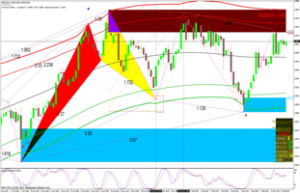As previously said, it is sometimes difficult to perceive the difference between a Forex scam and a fraud, brokers being quite clever about the boundaries of terms. Both scams and frauds encompass charging the client’s account for different commissions. Therefore, be sure that the spread will be the only broker’s fee. Many market maker charge incredibly overpriced swap (rollover) fees, and the nastiest ones will charge “Automatic Sweep fees” (transferring your profit into the currency of your country). This is absolutely forbidden and you should tell your broker you’re aware of this practice.
Trading robots
Another scam consists in selling software or “trading robots” supposed to guide you and/or make profit for you when you are away or sleeping. There’s no robot in this world that can react according to breaking news (such as ECB announcement or HSBC report). Robots are expensive and won’t help you much.
Another scam that may concern big investors comes in the way of “managed accounts”. If the broker says the capital will be managed by a professional in exchange of a commission, this might be “Ponzi” schemes. The most famous example is the French man Bernard Madoff who tricked a dozen of high line investors into investing money for his fictitious company.
Leverage scam
By proposing high leverage, both Market Makers and no dealing Desk brokers encourage traders to place very large positions. This increases the transaction as well as the risk of loss if the market doesn’t move where it is supposed to move. While professional currency traders such as banks, financial institutions, Pension Funds and other hedge funds tend to use no more than 15:1 leverage, retail clients may be offered leverage between 10:1 and 500:1.
Bonus scam
Many brokers offer bonuses but in order to take advantage from them you must trade and get three times the bonus “value”. This is another technique to trick you into overtrading and increase your chances to lose money. In other words, you’ll never see your bonus!
Trading style prohibition
Some brokers may tell you that scalping is forbidden! So however amazing it may sound, this is the case of ETX Capital (London), which changed its regulations after a phone call with me last week! The reason is simple: a market maker may not have the time to find counterparty in case of fast profit and should pay you right away from its own capital. ETX Capital considers that scalping is an operation than doesn’t exceed 2 minutes. Therefore, better ask your broker if scalping is allowed.
Conclusion: The simpler, the better. To sum-up, a good Forex broker should comply with the followings:
- no other commission than the spread
- a 24h/24 free multilingual assistance service
- a wide range of assets to trade
- no withdrawal fee (at least one free withdrawal per month)
- not located in Cyprus
- regulated by the AMF in Europe or the FCA in the United Kingdom
- competitive spreads
Catchy advertisements
On the internet, there are many advertisements promising fast and significant gains by trading the foreign exchange market. These ads’ main targets are beginners, because seasoned traders know that profits do not come in a snap. One tip: if the offer sounds too good to be true, flee!
The Forex coach
The trick of the Forex coach is widespread among corrupt brokers. The principle is simple: a salesperson calls you and literally sells his/her coaching services. He or she shares with you his/her insider tips, techniques, qualities in terms of trading, performances, etc. and trick you into joining the “winners team”. You are invited to open a trading account with the broker and enjoy free services. Obviously, once the account is funded, the story is not at all the same.
Always remember that:
- a demo account is always free
- a regulated broker is NOT allowed to give you any piece of advice about your trades
Trading conditions that evolve
Unregulated brokers often practice this type of scam. Generally, these dealers are counterparties and trade against their own customers. This means that when they win, their traders lose money. If you set out to win too, so the broker will change the trading conditions to his advantage. Some broker will even update their regulations.
Companies that help you recover your funds
With the amount of existing scams on the Forex market, new companies have emerged. This is your company offering to help you recover the swindled funds. It is important not to trust these structures that take huge commissions if funds are retrieved. It is better to discuss your problem with the AMF, a reliable and dedicated authority for the traders protection.
How to detect a Forex scam
Let’s look more closely at the main reasons why new traders fall into the trap of the “1000 pips per month-scam”. Scammers:
- receive positive feedback
- have great testimonials, sometimes with video support on their website
- have brilliant results from their “backtesting” (test period)
- have amazing results in advanced tests
Professional tips
Here are the tool every trader should master in order to make money on the Forex market and steer clear from scams:
- master the Japanese candlesticks
- know the news that impact the market and when they are released
- master the Fibonacci levels
- master the Ichimoku system.
As you can see, there’s no quick and easy method. Making money on the Forex market is about learning (2 years minimum), and there’s no need of robots or magical signals. Learn the craft and money will come!



